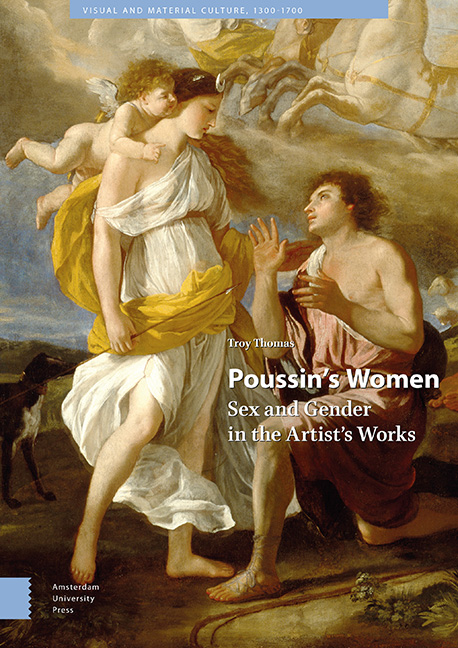Book contents
- Frontmatter
- Contents
- List of Illustrations
- Acknowledgments
- Part I – Violence and Virtue in Poussin’s Representations of Women
- Part II – Poussin’s Women—Cultural and Social Frames
- Part III – Paintings and Drawings
- 1 Predators
- 2 The Lustful—Triumphant, Impulsive, Spying, Conquered
- 3 Lovers—Genuine, Controlling, Unrequited, Jealous
- 4 Killers, Transgressors
- 5 Victims I—Killed, Assaulted
- 6 Victims II—Voiceless, Deceived
- 7 Heroines, Great Ladies
- Conclusion
- Bibliography
- Index
- Frontmatter
- Contents
- List of Illustrations
- Acknowledgments
- Part I – Violence and Virtue in Poussin’s Representations of Women
- Part II – Poussin’s Women—Cultural and Social Frames
- Part III – Paintings and Drawings
- 1 Predators
- 2 The Lustful—Triumphant, Impulsive, Spying, Conquered
- 3 Lovers—Genuine, Controlling, Unrequited, Jealous
- 4 Killers, Transgressors
- 5 Victims I—Killed, Assaulted
- 6 Victims II—Voiceless, Deceived
- 7 Heroines, Great Ladies
- Conclusion
- Bibliography
- Index
Summary
Abstract
Chapter 1 considers Poussin's canvases representing Cephalus and Aurora and Diana and Endymion, focusing on the goddesses as sexual predators who snare innocent mortal males, dominating them in love. Their stories reflect a patriarchal inversion in which men project the belief that females control them in love, whereas in Poussin's time the reverse was normally the case, as exemplified in laws and customs severely restricting women's sexual activities outside of marriage.
Keywords: Predation, Patriarchy, Inversion, Aurora, Diana, Gombauld
Two important paintings by Poussin, Cephalus and Aurora (c. 1629-1630, National Gallery, London, Fig. 1.2) and Diana and Endymion (c. 1630, Detroit Institute of Arts, Fig. 1.4), focus on goddesses as sexual predators who snare innocent mortal males, dominating them in love. The female deities in these myths destroy their earthly lovers: Cephalus is driven to suicide, and Endymion is lost in sleep, forever relinquishing his sentience. The stories of these ancient goddesses continued to reflect male fears of control by powerful females in the seventeenth century, a time when women were still imagined to be consumed with carnal fulfillment because of the biology of their bodies. It was still presumed by many, even if the most advanced physicians no longer thought so, that women's cold, wet humors and their wombs drove them to hyper-sexuality, whereas men's hot, dry humors supposedly disposed them towards rationality and restraint. In addition, reflected in the goddesses’ tales is a patriarchal inversion in which men project the belief that females control them in love, whereas in fact in Poussin's time the reverse was normally the case, as exemplified in laws and customs severely restricting women's sexual activities outside of marriage. Poussin announced the theme of predation early in his career, around 1624-1625, with his Cephalus and Aurora now at Hovingham Hall (Fig. 1.1), and a few years later developed the idea further in the two great works from his early maturity in London and Detroit. In these pictures the artist shows the power the two goddesses hold over the men, and the differing reactions of the latter. In the London canvas Cephalus clearly rejects the advances of Aurora, and in the Detroit painting Endymion reveals, mixed together, the more complex emotions of awe, love, and fear.
- Type
- Chapter
- Information
- Poussin's WomenSex and Gender in the Artist's Works, pp. 95 - 122Publisher: Amsterdam University PressPrint publication year: 2020



